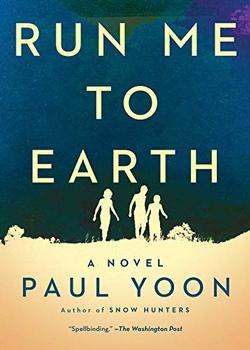Summary | Excerpt | Reading Guide | Reviews | Beyond the Book | Readalikes | Genres & Themes | Author Bio

The siblings tried to sleep, their limbs making scratching noises on the marble floor as they settled. If it rained they would have to move, but through the course of the year they had become better at predicting the weather, and tonight they bet it wouldn't. The gap was perhaps the circumference of a jar in the valley. They liked looking up at it. If the sky was small enough, there was less of a chance of an airplane crossing over it. If the sky was small enough, it was just the sky.
Alisak stayed up, watching Noi, then watching the beds, first shift. If something happened, if someone tried to rip the IV from their arms and leave, or if someone screamed because the morphine was exiting out of their bodies, he would have to run down the hall past the six mirrors on each wall that caught his movements until he found a doctor or a nurse.
Most of them were in the kitchen, sleeping in whatever privacy they could imagine as they lay on a counter or on the floor, in a closet or against the angle of cupboards, having drunk enough whiskey to knock themselves out. Some of the staff had even begun to take the morphine themselves, the ends of a suturing thread from an operation still wrapped around their fingertips like a good-luck charm. And sometimes, resting on their open palm, as though they were perpetually ready for surgery, there would be a scalpel.
For this, for keeping watch and for keeping the ward clean, for assisting these people who were trying to save as many civilians as possible in a war that had been going on in various forms for almost all their lives (and for riding the motorcycles), they were paid more American dollars in a day than they could earn in six months on the streets of Phonsavan.
They had even learned some English and French this year from the Vientiane doctor they called Vang. He was perhaps in his thirties, if that, wore glasses he kept misplacing, and, as it turned out, was not only proficient in several languages but played the piano.
In the ward, when his two friends were asleep, Alisak practiced saying some French phrases to himself as the sky flashed with another detonation and the woman on the bed placed an arm across her eyes, her mouth slowly moving as though she were practicing the language with him.
He wondered, as he often did, about the Frenchman who once lived here. He—the Frenchman—was a captain from the Second World War, had retired here and gotten rich off the tobacco fields around the property that no longer existed. For Alisak, he was all rumor: a drunk and a womanizer who spent his days in a long silk bathrobe waiting for his next party to begin; a man who had stayed in this country for much longer than most of the French and whose allegiances could be bought; who, early in the war, let North Vietnamese soldiers use his fields as a route on their way to the southern parts of Vietnam.
How much of this was true? Alisak, entering a room, would sometimes pause, wondering what his days and routes were like within this house that was the size of a small village.
Noi had in fact met him once, Alisak only at a glance, long before they knew who he was. He pulled up to them on the side of the road one day and had asked if he could hire Noi to help in the kitchen at one of his parties. So she had gone with him, though she refused to speak much about that evening. She only shared with Alisak the bits of conversations she had overheard from the partygoers—Did you ever notice the river is changing temperature?—and that the man was very strange. That, and her regret at not eating more of the food she had been hired to carry on silver trays.
Noi had been twelve. In the rare times she mentioned him at all, she called him the Tobacco Captain. So Alisak had begun to think of him that way. Strike a match. Captain of not much, just ash. This man who had lived alone in this house he had built for himself with all its windows that revealed all the distances. A house that even now, as a skeleton, seemed to Alisak as grand and mysterious as a temple.
Excerpted from Run Me to Earth by Paul Yoon. Copyright © 2020 by Paul Yoon. Excerpted by permission of Simon & Schuster. All rights reserved. No part of this excerpt may be reproduced or reprinted without permission in writing from the publisher.
Your guide toexceptional books
BookBrowse seeks out and recommends the best in contemporary fiction and nonfiction—books that not only engage and entertain but also deepen our understanding of ourselves and the world around us.